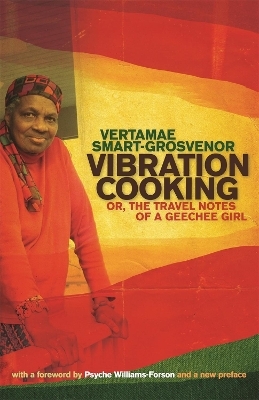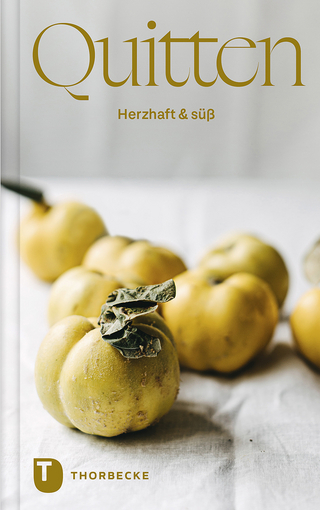
Vibration Cooking
Or, The Travel Notes of a GeeChee Girl
Seiten
2011
University of Georgia Press (Verlag)
978-0-8203-3739-5 (ISBN)
University of Georgia Press (Verlag)
978-0-8203-3739-5 (ISBN)
First published in 1970, not long after the term ""soul food"" gained common use. While critics were quick to categorize her as a proponent of soul food, Smart-Grosvenor wanted to keep the discussion of her cookbook/memoir focused on its message of food as a source of pride and validation of black womanhood and black ""consciousness raising"".
Vibration Cooking was first published in 1970, not long after the term “soul food” gained common use. While critics were quick to categorize her as a proponent of soul food, Smart-Grosvenor wanted to keep the discussion of her cookbook/memoir focused on its message of food as a source of pride and validation of black womanhood and black “consciousness raising.”
In 1959, at the age of nineteen, Smart-Grosvenor sailed to Europe, “where the bohemians lived and let live.” Among the cosmopolites of radical Paris, the Gullah girl from the South Carolina low country quickly realized that the most universal lingua franca is a well-cooked meal. As she recounts a cool cat’s nine lives as chanter, dancer, costume designer, and member of the Sun Ra Solar-Myth Arkestra, Smart-Grosvenor introduces us to a rich cast of characters. We meet Estella Smart, Vertamae’s grandmother and connoisseur of mountain oysters; Uncle Costen, who lived to be 112 and knew how to make Harriet Tubman Ragout; and Archie Shepp, responsible for Collard Greens à la Shepp, to name a few. She also tells us how poundcake got her a marriage proposal (she didn’t accept) and how she perfected omelettes in Paris, enchiladas in New Mexico, biscuits in Mississippi, and feijoida in Brazil. “When I cook, I never measure or weigh anything,” writes Smart-Grosvenor. “I cook by vibration.”
This edition features a foreword by Psyche Williams-Forson placing the book in historical context and discussing Smart-Grosvenor’s approach to food and culture. A new preface by the author details how she came to write Vibration Cooking.
Vibration Cooking was first published in 1970, not long after the term “soul food” gained common use. While critics were quick to categorize her as a proponent of soul food, Smart-Grosvenor wanted to keep the discussion of her cookbook/memoir focused on its message of food as a source of pride and validation of black womanhood and black “consciousness raising.”
In 1959, at the age of nineteen, Smart-Grosvenor sailed to Europe, “where the bohemians lived and let live.” Among the cosmopolites of radical Paris, the Gullah girl from the South Carolina low country quickly realized that the most universal lingua franca is a well-cooked meal. As she recounts a cool cat’s nine lives as chanter, dancer, costume designer, and member of the Sun Ra Solar-Myth Arkestra, Smart-Grosvenor introduces us to a rich cast of characters. We meet Estella Smart, Vertamae’s grandmother and connoisseur of mountain oysters; Uncle Costen, who lived to be 112 and knew how to make Harriet Tubman Ragout; and Archie Shepp, responsible for Collard Greens à la Shepp, to name a few. She also tells us how poundcake got her a marriage proposal (she didn’t accept) and how she perfected omelettes in Paris, enchiladas in New Mexico, biscuits in Mississippi, and feijoida in Brazil. “When I cook, I never measure or weigh anything,” writes Smart-Grosvenor. “I cook by vibration.”
This edition features a foreword by Psyche Williams-Forson placing the book in historical context and discussing Smart-Grosvenor’s approach to food and culture. A new preface by the author details how she came to write Vibration Cooking.
Vertamae Smart-Grosvenor (1937–2016) was a poet, actress, culinary anthropologist, and writer. She is the author of Thursdays and Every Other Sunday Off: A Domestic Rap, Vertamae Cooks in the Americas’ Family Kitchen, and Vertamae Cooks Again: More Recipes from the Americas’ Family Kitchen. She has served as a correspondent and host for National Public Radio and written for the New York Times, the Village Voice, the Washington Post, Life, Ebony, and Essence.
| Vorwort | Psyche Williams-Forson |
|---|---|
| Verlagsort | Georgia |
| Sprache | englisch |
| Gewicht | 456 g |
| Themenwelt | Literatur ► Biografien / Erfahrungsberichte |
| Sachbuch/Ratgeber ► Essen / Trinken ► Grundkochbücher | |
| Sachbuch/Ratgeber ► Essen / Trinken ► Länderküchen | |
| Sozialwissenschaften ► Soziologie | |
| ISBN-10 | 0-8203-3739-0 / 0820337390 |
| ISBN-13 | 978-0-8203-3739-5 / 9780820337395 |
| Zustand | Neuware |
| Haben Sie eine Frage zum Produkt? |
Mehr entdecken
aus dem Bereich
aus dem Bereich
deine Lieblingsrezepte - einfach gemacht!
Buch | Hardcover (2023)
Gräfe und Unzer (Verlag)
CHF 39,90
wie du zu Hause die beste Pizza deines Lebens backst
Buch | Hardcover (2024)
Becker Joest Volk Verlag
CHF 41,90


